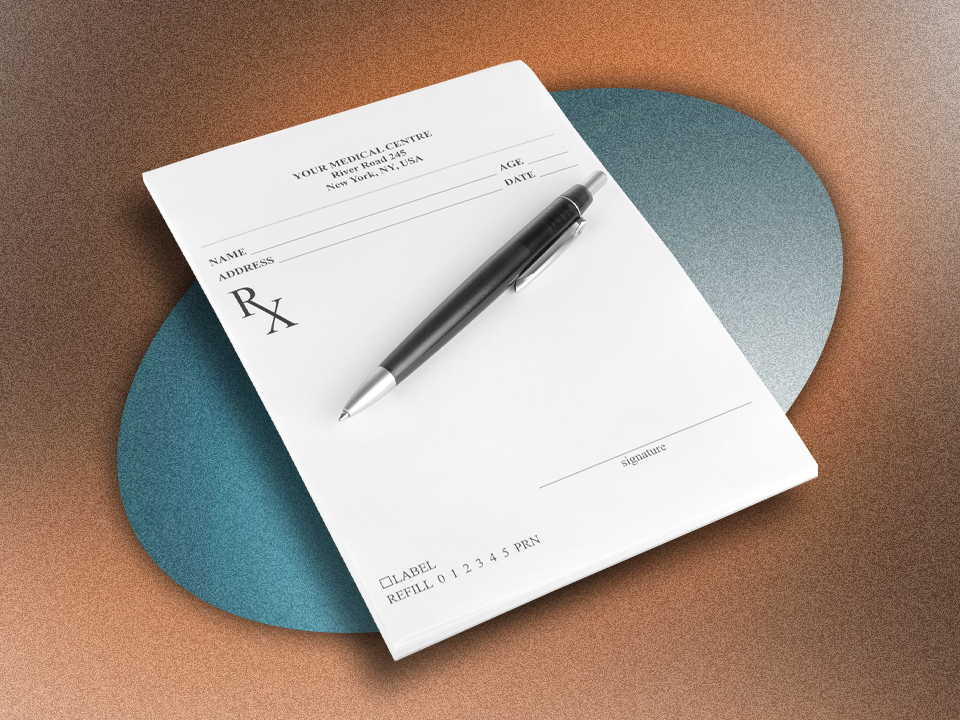7 Things You Should Know Before Seeing a Psychiatrist
For starters, you won't always leave with a prescription.
When it comes to seeing someone for your mental health, there are (thankfully) a lot of options out there. But you could be wondering why you might choose a psychiatrist over, say, a psychologist or other types of therapists. So what is a psychiatrist anyway, and what exactly do they offer that different mental health pros don't?
A psychiatrist is a medical doctor (MD or DO) who specializes in the diagnosis and treatment of mental health conditions like anxiety disorders, depression, OCD, and more. Although they’re trained in psychotherapy, their training does tend to focus on medication management for those conditions, says psychiatrist Juan Romero-Gaddi, MD.
Whether you’re currently on mental health meds or thinking about going on them, they can answer questions about dosage, side effects, or anything else that’s worrying you, says psychiatrist Melissa Shepard, MD. They’ve heard it all, so hit them with any and all concerns, she says. And because of their physician status, they can also order any medical tests that seem relevant to your situation, if that’s necessary, according to the American Psychiatric Association.
While there’s a good amount of overlap between what psychiatrists, psychologists, and other mental health pros offer, a psychiatrist is most often who you’d see to get mental health meds (or, in some cases, a combination of meds and therapy). That said, primary care doctors can also write you a prescription, and, according to the American Psychological Association, so can some psychologists in certain states. While you can go to a psychiatrist for just therapy, Dr. Romero-Gaddi emphasizes that psychologists, who have a doctoral degree in psychology (PhD, PsyD, or EdD), and other therapists like social workers and counselors are probably a better option if all you’re looking for is talk therapy.
If you’re considering a visit to a psychiatrist or prepping for your first appointment with one, you might have some questions about what to expect. Here are a few important things to know before your first session.
1. Finding a psychiatrist can be a process, so don’t hesitate to ask for help.
You can get in touch with a psychiatrist any time, but the earlier the better when it comes to how bad your symptoms are, says Dr. Romero-Gaddi. As with any mental health care (or physical health care, for that matter), seeing a psychiatrist can be pricey, depending on your insurance status and who you want to see. If possible, try to find a psychiatrist who takes your insurance—the best option is to go on your insurance website and see what psychiatrists are in-network, Dr. Romero-Gaddi says. While you still might have to pay a copay each visit, going to a provider that bills your insurance for the majority of the cost of the appointment can save you money.
If you don’t have insurance or can’t find a psychiatrist with the availability or expertise you need in your insurance network, call ahead to find out what the psychiatrist charges for an out-of-pocket session. Some offer sliding-scale options—aka, discounted rates for patients depending on their income or ability to pay—so check those out, Dr. Shepard says. You should also call your insurance company to find out if they will cover part of your out-of-network sessions once you meet your deductible.
FYI, some insurance companies require you to get a referral to see a psychiatrist from either your primary care provider or another licensed mental health provider, like a therapist, Dr. Romero-Gaddi notes. The majority of patients that both he and Dr. Shepard see don’t typically need referrals, but it might be helpful to ask your primary care doctor or therapist, if you have one, for help finding a psychiatrist anyway. This concludes your brief lesson on the frustrating realities of health insurance.
Another place Dr. Romero-Gaddi suggests searching for a psychiatrist is Psychology Today. You’ll be able to filter by location, gender, price, and more.
2. Your first appointment will probably be an assessment.
Before you start panicking about what deep stuff you’ll get into during your first appointment, keep in mind that the initial visit is usually more of a “diagnostic assessment,” says Dr. Romero-Gaddi. Don’t be surprised if they send you a form to fill out in advance that helps them screen you for mental health conditions such as anxiety and depression, he says.
They might also ask you to bring or forward some medical records that can help them better understand your history—like any previous hospitalizations, medications, or diagnoses worth noting, says Dr. Shepard. Yes, this process of chasing down info from doctors' offices and therapy practices can be tedious as hell, but it’s important for your psychiatrist to get the full picture of what you’re dealing with and what you’ve tried in the past before they begin treating you.
Once you’re there, they’ll ask you more questions about your medical history, your family’s medical history, and your current symptoms. Since some psychiatrists offer therapy in addition to prescribing medication, they’ll probably ask you what you’re looking to get out of meeting with them, Dr. Romero-Gaddi explains. Yep, it’s thorough.
3. You may or may not walk away with a prescription.
After speaking with you, a psychiatrist should be able to deduce if medication is even necessary and, if so, what meds and treatment plan is right for you. “I'll talk to them about what I think might be going on, and then, given what's going on, what the research has shown is probably going to be the best treatment for that, whether that be therapy, medications, or a combination of both,” Dr. Shepard explains. You might also talk about lifestyle changes you can make or other treatment programs that could be helpful, she says.
If you’re prescribed medication, your psychiatrist will talk to you about the most common side effects and, just to be safe, the ones that aren’t really common but can be serious, says Dr. Romero-Gaddi. For example, for selective serotonin reuptake inhibitors (SSRIs), which psychiatrists prescribe a lot for depression and anxiety, common side effects are GI issues, dry mouth, dizziness, headaches, and issues with sex drive, he says.
One big misconception about psychiatry is that you have to be on meds. It’s actually totally normal and fine to see a psychiatrist and decide to hold off on a mental health prescription, Dr. Shepard says. The most important thing is that you understand why the psychiatrist is recommending a certain medication and that they answer all of your questions about it, she adds. Sure, these mental health pros are there to help you make that decision, but the choice is ultimately yours.
In many cases, Dr. Romero-Gaddi will tell his clients to go home after the first appointment, do their own research if they want, and then contact him if they’re interested in treatment. “The reality is that unless there are significant safety concerns, like when hospitalization is required, they are the ones to decide if they want to start the recommended treatment or consider other options,” he says. Also, sometimes people will come to Dr. Romero-Gaddi with mild symptoms that aren’t interfering too much with their daily lives, so he’ll tell them that, in his opinion, the potential side effects of meds aren’t even worth it in those scenarios. It all depends on how you are impacted by what you’re experiencing.
Remember, going on medication for your mental health does not make you weak. However, you—and the 16.5% of U.S. adults who say they take these meds—might need to unlearn the internalized shame often associated with mental health prescriptions. If it helps, over a dozen people previously told Wondermind that this treatment option really can enable you to live a better life.
4. Showing up prepared is super helpful.
Getting started with a psychiatrist can be intimidating, and you might feel so overwhelmed that you forget what you wanted to discuss. So, write down some reminders for yourself about things like your medical history, any major symptoms you’ve been dealing with, treatment questions, and any other concerns you have, suggests Dr. Romero-Gaddi. Not having to remember all that can help you stress a little less and leave the appointment feeling more knowledgeable than when you went in. *Checks notes*...you’ll be OK!
If you’re meeting with a psychiatrist to discuss mental health meds, do a quick check of the prescription medications or supplements you’re currently taking. Make sure you know the names, dosage, and how often you take them. This helps your psychiatrist make sure that anything they prescribe you doesn’t interact with what you’re already taking, says Dr. Romero-Gaddi. And you can just bring the actual pill bottles if that’s easier, Dr. Shepard points out.
Finally, make a note of how you’re feeling on your current mental health meds, whether you’re dealing with sucky side effects, you truly can’t notice a difference since you began taking them, or you want to try something else. “I always ask my patients, ‘What do you like and what don’t you like about your medication?’” Dr. Romero-Gaddi says.
Also, if you’re not comfortable going alone, you can take a support person with you (your emotional support water bottle counts, of course!), but be prepared for them to leave the room if your psychiatrist asks more private questions, says Dr. Romero-Gaddi.
5. You might get emotional.
Again, some psychiatrists do offer therapy sessions, but even if you’re at a psychiatry appointment talking about medication and you start to feel a whole bunch of feelings, that’s 100% OK, says Dr. Romero-Gaddi. Stressors and symptoms can feel difficult to address, and you can tell your psychiatrist as much as you’re comfortable with, he assures. Don’t feel like you have to hold back emotion if you’re frustrated, scared, whatever.
6. You might have to actually ask about your diagnosis.
If your psychiatrist doesn’t tell you after the first few appointments what they think you might be dealing with, don’t be afraid to ask, says Dr. Romero-Gaddi. Some people are hesitant to bring up a diagnosis with their psychiatrist, but you have every right to know what’s going on. Plus, if you want to see someone for a second opinion about a diagnosis, that’s OK too, he adds.
7. How often you go depends on your treatment plan.
After that first appointment, the ones that follow are usually shorter and less intense. Instead of going through your medical history, you’ll check in about how medication is working or not working for you, if you have any concerns regarding side effects (like changes in sleep or energy levels), and if there should be any tweaks to your prescription, Dr. Romero-Gaddi says. Since the psychiatrist is monitoring how starting or switching meds affects you, those first few appointments for medication management might happen every two weeks or so, Dr. Shepard notes.
Then, once you’ve sorted out what meds are right for you and what the best dose is, there can be chunks of time between sessions. Some people only have appointments every six months, says Dr. Romero-Gaddi. That said, if you do plan to see this psychiatrist for therapy, then your sessions would happen way more frequently.
One last FYI: If cost or time is an issue, definitely let the psychiatrist know so you can make sure you're seeing them regularly enough to monitor you while also honoring your limitations, Dr. Shepard urges.
Wondermind does not provide medical advice, diagnosis, or treatment. Any information published on this website or by this brand is not intended as a replacement for medical advice. Always consult a qualified health or mental health professional with any questions or concerns about your mental health.




